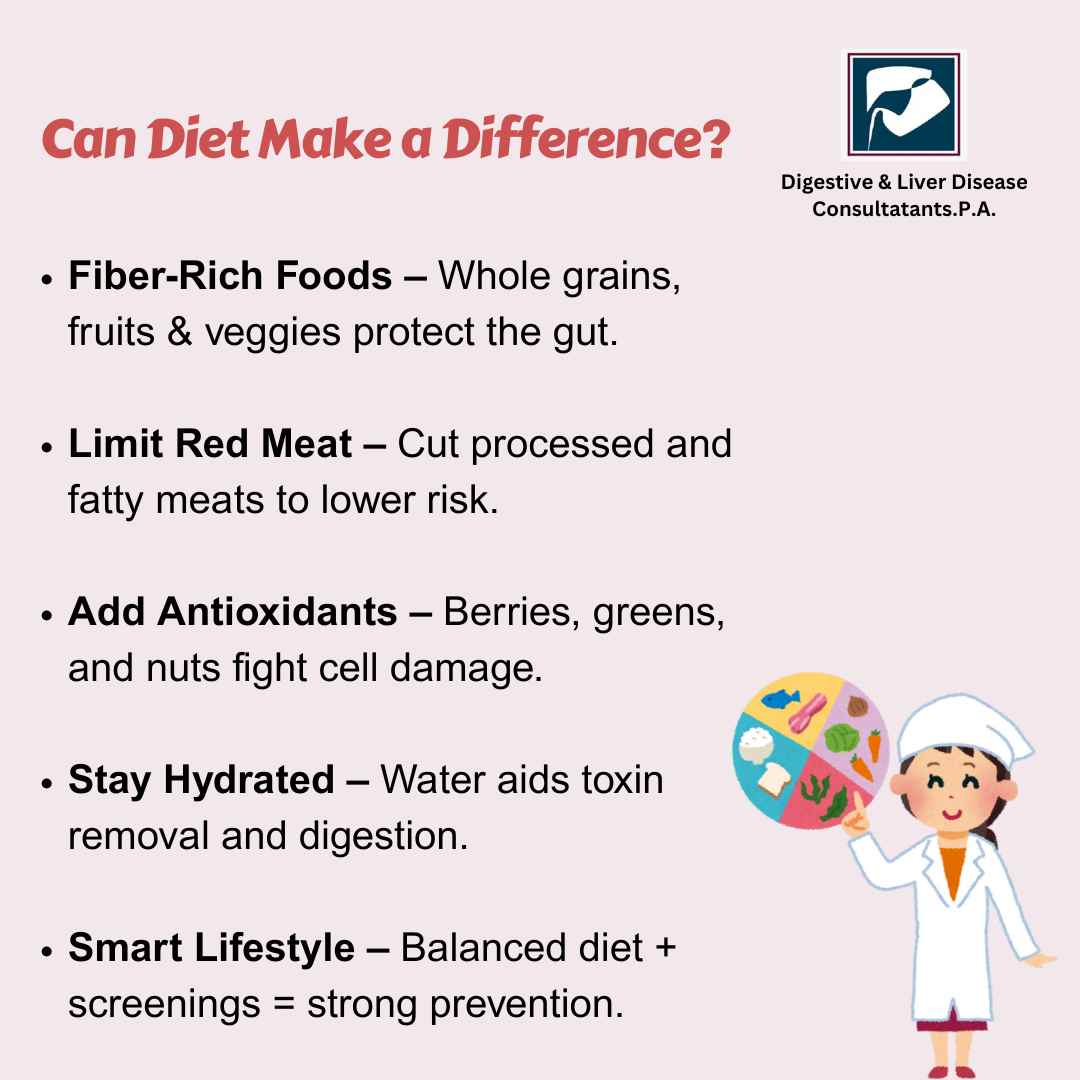Gastrointestinal (GI) cancers, which include cancers of the stomach, colon, liver, pancreas, and esophagus, are among the most common and serious health concerns worldwide. While factors like genetics and age play a role, diet and lifestyle choices have a powerful impact on your risk of developing these cancers. The food you eat every day can either protect your digestive system or increase inflammation and damage that may lead to cancer over time.
So, can GI cancers be prevented with diet? The short answer is yes — at least in part. Let’s explore how healthy eating habits can protect your digestive tract and what foods you should include (or avoid) to lower your risk.
Understanding GI Cancers
GI cancers develop in the organs of your digestive tract — from the esophagus and stomach to the colon, rectum, pancreas, and liver. These cancers often start with small changes in the cells lining the digestive system. Over time, those changes can grow into tumors, especially when triggered by poor dietary habits, smoking, alcohol, and a lack of physical activity.
Some of the most common types of GI cancers include:
- Colorectal cancer (colon and rectum)
- Liver cancer
- Pancreatic cancer
- Stomach (gastric) cancer
- Esophageal cancer
Fortunately, many of these cancers can be prevented or detected early with the right diet and screening.

How Diet Affects GI Cancer Risk
Your diet directly impacts inflammation, cell growth, and the health of your gut microbiome — all of which play a role in cancer development. A diet high in processed foods, red meat, refined sugars, and saturated fats can damage the gut lining and promote chronic inflammation. Over time, this environment increases the risk of abnormal cell growth.
On the other hand, diets rich in fiber, antioxidants, vitamins, and minerals support healthy digestion, reduce oxidative stress, and protect your body from harmful toxins.
Foods That May Help Prevent GI Cancers
1. High-Fiber Foods
Fiber is one of the best nutrients for digestive health. It helps food move smoothly through your intestines, reduces constipation, and supports beneficial gut bacteria. Studies show that a high-fiber diet can lower the risk of colorectal cancer.
Include foods such as:
Whole grains (brown rice, oats, barley, quinoa)
Fresh fruits and vegetables
Beans, lentils, and legumes
2. Fruits and Vegetables
Colorful produce is full of antioxidants and phytochemicals that help protect cells from damage. Cruciferous vegetables like broccoli, cauliflower, cabbage, and Brussels sprouts contain natural compounds that may reduce cancer risk by supporting the body’s detoxification processes.
3. Healthy Fats
Not all fats are harmful. Omega-3 fatty acids, found in fatty fish like salmon and sardines, can reduce inflammation and may protect against certain cancers. Olive oil, nuts, and seeds are also good sources of healthy fats that support gut and heart health.
4. Lean Proteins
Replace red and processed meats with lean proteins such as chicken, fish, tofu, and legumes. Studies have found that high intake of processed meats like bacon, sausages, and hot dogs is linked to an increased risk of colorectal and stomach cancers.
5. Probiotic and Prebiotic Foods
Your gut microbiome plays a key role in maintaining digestive health. Probiotics (found in yogurt, kefir, and fermented foods) introduce healthy bacteria to your digestive tract, while prebiotics (found in foods like garlic, onions, bananas, and oats) feed those good bacteria. Together, they help strengthen your gut barrier and reduce inflammation.
6. Hydration
Drinking enough water helps your digestive system work efficiently and supports the elimination of toxins. Limit sugary sodas and alcohol, which can irritate the stomach lining and contribute to cancer risk.
Foods and Habits That Increase Risk
To protect your gut, it’s just as important to know what to limit or avoid.
1. Processed and Red Meats
Consuming large amounts of processed meats can increase exposure to carcinogenic compounds formed during preservation or high-temperature cooking.
2. Sugary and High-Fat Foods
Diets high in refined sugars and unhealthy fats can lead to obesity, insulin resistance, and inflammation — all of which are linked to higher cancer risk.
3. Alcohol
Excessive alcohol consumption can damage the liver and irritate the lining of the digestive tract, increasing the risk of esophageal, liver, and colorectal cancers.
4. Smoking
While not a food, smoking greatly increases your risk of many GI cancers. Quitting smoking and avoiding secondhand smoke can dramatically reduce your risk.
Lifestyle Choices That Support Prevention
A healthy diet works best when paired with other lifestyle habits:
Maintain a healthy weight: Obesity is linked to higher rates of colon, liver, and pancreatic cancers.
Exercise regularly: Aim for at least 30 minutes of moderate activity most days.
Get regular screenings: Colonoscopies and other diagnostic tests can detect precancerous changes early.
Manage stress: Chronic stress can affect your digestive system and overall immune response.
About Digestive & Liver Disease Consultants, P.A.
At Digestive & Liver Disease Consultants, P.A., our board-certified gastroenterologists specialize in the prevention, diagnosis, and treatment of gastrointestinal and liver diseases. We are committed to helping patients across Texas achieve long-term digestive wellness through advanced diagnostic tools, personalized treatment plans, and expert care.
Our team provides comprehensive services for conditions such as colon cancer, liver disease, acid reflux, irritable bowel syndrome (IBS), inflammatory bowel disease (IBD), and more. We also emphasize preventive care and patient education, helping you make informed lifestyle and dietary choices that support your digestive health.
Conclusion
While diet alone cannot completely prevent gastrointestinal cancers, healthy eating plays a vital role in reducing your risk. Choosing nutrient-rich foods, maintaining a balanced lifestyle, and avoiding harmful habits can significantly improve your gut and overall health.
By making smarter food choices today, you’re taking an important step toward protecting your digestive system for the future.
If you’re concerned about your digestive health or family risk for GI cancers, schedule a consultation with the experts at Digestive & Liver Disease Consultants, P.A. Our specialists are here to help you stay healthy and informed.






